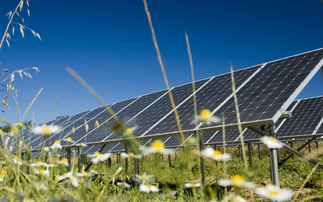"The government should be providing solid, stable support for such developments and not disadvantaging this growing sector"
The government yesterday announced a major shake-up of the subsidy regime for the UK's solar industry, detailing plans to stop solar farms securing support through the Renewables Obligation and putting forward proposals to drive investment in commercial rooftop solar installations and community owned projects.
However, trade associations and developers from across the industry responded angrily to the proposals, accusing ministers of deliberately trying to undermine a fast-growing industry.
BusinessGreen brings together reaction from across the green economy:
Paul Barwell, chief executive, Solar Trade Association (STA):
"The costs of solar power have kept on falling, in large part thanks to the growth and learning in our successful UK industry. We had forecast solar could be cheaper than onshore wind by 2018, but for this to happen we needed stable policy sustaining a high-volume market. The government is actually moving to slow down solar's cost reductions towards grid parity.
"The industry will be alarmed by these proposals and surprised to be singled out for harsh treatment. It does look like the government is seeking to define the energy mix and hiding behind the false excuse of 'budget management'.
"DECC challenged us to work with communities to ensure solar remained popular as the large scale sector developed, and we've done just that. With our '10 Commitments' good practice guidance published last summer, and the National Solar Centre's biodiversity best practice guidance just last week, the sector has developed high standards and a legacy to be proud of - public support for solar and large scale renewables is the highest it's ever been. Today's proposals are no just reward. If these proposals go through they will knock the industry's extraordinary progress back, and actually reduce healthy competition in the renewables sector."
"This feels like a kick in the teeth for exceptional performance. Our costs have dropped 30 per cent against offshore wind in two years and we have devoted a year to driving good practice throughout the industry. This is not a just reward."
A DECC spokesperson:
"Solar PV is an integral part of the UK's energy mix and we want to see this success story continue. Our recent Solar Strategy will ensure we remain a leading destination for investment and deployment of solar energy.
"As renewable technology matures and costs come down it is right those savings are passed on to consumers. Our ultimate goal is for renewables to be competitive with other forms of electricity generation and we will balance government support with the need to provide value for money to consumers and bring on essential new investment."
Seb Berry, head of public affairs, Solarcentury
"Today's announcement is unnecessary and totally at odds with the government's desire to reduce the cost to energy bill payers of delivering the 2020 renewable energy target. Following close behind recent unhelpful media coverage of onshore wind policy, this policy proposal will undermine investor confidence in the entire UK renewable energy sector, by removing at a stroke the short and medium-term policy certainty required for major project investments. It is very surprising that such a deeply damaging policy proposal has been cleared by the Treasury.
"It is equally surprising that the government is trying justify this proposal on cost grounds. Large-scale solar is already significantly cheaper than offshore wind and will be competitive with onshore wind by 2017. In deliberately setting out to strangle the growth of cheaper solar from 2015, Secretary of State Davey can no longer claim that government policy will deliver the most cost-effective mix of technologies by 2020.
"It's extremely disappointing that these RO proposals were not tested out first privately with senior industry representatives in the Minister's top level solar strategy group, which includes Solarcentury. The reality is that large-scale solar PV in the UK is one of, if not the major success stories of coalition green energy policy since 2010, but now the outlook beyond the end of this financial year is extremely uncertain."
Dr Doug Parr, chief scientist, Greenpeace UK:
"Solar is hugely popular in the UK, costs are falling faster than for any other energy source, and the latest technology is on track to beat nuclear on price. Sowing uncertainty for a key source of clean, homegrown energy, as ministers are doing, makes no economic, political, or strategic sense.
"Far from hitting the big energy companies this compulsive policy tinkering sucks confidence out of independent generation and leaves the future of community solar projects up in the air - yet independent producers are our best hope to challenge the big six's stranglehold on the market.
"The fracking industry makes wild claims about getting us off energy imports and gets everything it wants from Government even though it's locally unpopular and production is a decade away. Instead an industry like solar that enjoys strong public backing and is delivering electricity and jobs right now has to keep reacting to routine cycles of uncertainty and reviews."
Robert Goss, managing director, Conergy UK
"Let's wait on the results of the consultation but DECC's proposals are more of a gradual recalibration than an earthquake for British solar. Rather than disappearing overnight, we would just select sites in a different way. Many large projects would still be built under the CFDs, and ROCs would remain in force in Northern Ireland, where development would become very competitive. In other parts of the UK there would be a downsizing of the scale of many new solar farms, which is politically attractive, but offers encouragement for sites that have been neglected over the last few months."
Dr Nina Skorupska, chief executive, REA:
"Clear, stable policy attracts investment, creates jobs and drives growth and cost reductions in renewable energy technologies. However, there is not much clarity or stability on show today. The piecemeal approach to the CfD scheme leaves a lot of questions still unanswered, and the lack of capacity ring-fencing for most technologies compounds that uncertainty. Without knowing what DECC intends to do in terms of setting out the budget, making sense of CfD proposals is like trying to complete a jigsaw puzzle without seeing the picture on the lid.
"Solar power meanwhile is subjected yet again to devastating instability. Government must ensure that policy drives and rewards technology cost reductions with a stable trajectory of gradually declining financial support, not the cliff edge the Government is proposing for solar.
"We really want to see much greater community involvement in the energy mix, something renewable energy is uniquely able to facilitate. It's encouraging to see Government pushing back against the Commission's State Aid Guidelines to ensure greater diversity and competition in our electricity supply.
"Renewable energy reduces carbon emissions, can be built quickly to address the capacity crunch, and can crack open the energy market to wider involvement with SMEs, local authorities, farmers and communities. The 100,000 employees in UK renewables need more of this kind of championing from the Government."
Karl Harder, co-founder and joint managing director, Abundance Generation:
"Solar power is not only a new, clean energy source supported by 85 per cent of the UK public, but it's one that's being invested in too. The key to diversifying our energy supply, keeping prices down and cutting emissions is ensuring stability for this growing industry - not stop start policy changes. Ultimately investment will continue, and flow into on roof solar, such is the demand we're seeing, but really - what kind of government would stop the most democratic, clean energy source from thriving?
"We must separate decisions on energy from political whims once and for all. If politicians cannot be trusted to not put winning short term votes ahead of sensible energy policy then we should vote to take such decisions away from them. Similar to Gordon Browns transfer of interest rates policy to the Bank of England, renewable energy tariff decisions should be dealt with by a non-political body. The British public has moved on, they're looking for win win investments and old school Government thinking is being left behind."
Leonie Greene, head of external affairs, STA:
"We'll be pushing back hard against these proposals to ensure good quality solar power is treated fairly. We are astonished that government is effectively proposing to decide for local communities what renewable energy developments they can or cannot have. By making solar more difficult to deploy at scale than other renewables the Secretary of State is proposing to tilt the whole national playing field against solar power investments. As with every other development decisions should lie with local government - not central government.
"The government says it wants to see a lot of mid-scale rooftops but everyone involved in solar knows the UK policy framework is inadequate. We have been warning DECC they must fix the user-friendly Feed-in Tariffs for medium and large scale projects for nearly a year. Not only would these proposals tilt the playing field against solar power per se, but they also expose the bias against everyday decentralised energy investors. It is long overdue that Government gave communities, businesses and the public sector the same access to renewables as utilities.
"We urge DECC to work with us as soon as possible to deliver fair proposals, including making the new CfDs work for solar, and fixing FITs for the mid to large scale rooftop projects they claim they want to support."
Robert Goss, managing director, Conergy UK
"Let's wait on the results of the consultation but DECC's proposals are more of a gradual recalibration than an earthquake for British solar. Rather than disappearing overnight, we would just select sites in a different way. Many large projects would still be built under the CFDs, and ROCs would remain in force in Northern Ireland, where development would become very competitive. In other parts of the UK there would be a downsizing of the scale of many new solar farms, which is politically attractive, but offers encouragement for sites that have been neglected over the last few months."
Juliet Davenport OBE, founder and chief executive, Good Energy:
"We will be meeting the Secretary of State today to set out our concerns about any reduction in support for larger scale solar projects. We believe the government should be providing solid, stable support for such developments and not disadvantaging this growing sector.
"Today's announcement from DECC for proposals to close the renewables obligation to all new 5MW developments from April next year is therefore very disappointing. This will undermine growth, investment and jobs in a sector which is helping to introduce more competition and new players into the energy market. This decision will bring further instability and uncertainty to investors, and we will have to reconsider our portfolio of investments as a result."
"Solar offers the opportunity for diversifying investment away from the traditional 'Big Six', bringing with it the potential for job creation and further investment. Solar developments also help the growth of small-scale new generators as well as communities who want to generate their own clean energy, have viable alternatives to the big six and reduce their energy bills - paving the way for the 'Big 60,000'!
"The solar sector needs a stable policy framework from which to grow - we believe if properly supported now, it could compete equally on cost with other technologies by the end of this decade. What it does not need is revised levels of support and political uncertainty, which will serve only to stifle investment, growth, competition and ultimately, the opportunity to make a meaningful low-cost, low-carbon contribution to the UK's longer-term energy security."
Alasdair Cameron, energy campaigner, Friends of the Earth:
"This review shows that the government's renewables strategy is in some disarray and struggling to catch up with developments. Every time a renewable energy technology starts to do well it gets hit by a wave of government uncertainty, which pushes up costs and threatens jobs and investment.
"Attacking large-scale solar parks, while doing almost nothing to boost rooftop systems, is another sign of this government's piecemeal approach to policy making. Solar power is cheap, popular and essential for tackling climate change and energy security.
"UK renewables should be the should be the cornerstone of future UK energy policy - not fracking. But yet again the government has totally underestimated its potential."
Ray Noble, co-chair of DECC's Solar Strategy and STA PV specialist:
"The coalition appears to be playing politics with solar rather than praising its success in delivering significant amounts of much needed power from safe and secure sunlight. The government should be backing this incredibly popular technology and taking care to understand its exceptional benefits, including the fact that it substantially reduces transmission losses by generating electricity where it is needed."








